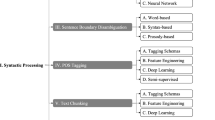Abstract
The paper describes the newly improved Korean morpheme analysis module KorMa 2003. This new module applies the custom user dictionary for analyzing new and unknown words and special terms and operates an automatic word spacing module during post-processing to prevent failures of sentence analysis due to incorrect spacing between words. KorMa 2003 has accuracy enhanced by 15% in comparison with the previously reported version.
This research was supported by the MIC (Ministry of Information and Communication), Korea, under the Chung-Ang University HNRC-ITRC (Home Network Research Center) support program supervised by the IITA (Institute of Information Technology Assessment).
Preview
Unable to display preview. Download preview PDF.
Similar content being viewed by others
References
Gelbukh, A., Sidorov, G.: Morphological Analysis of Inflective Languages through Generation. Procesamiento de Lenguaje Natural (29), 105–112
Gelbukh, A., Sidorov, G.: Approach to construction of automatic morphological analysis systems for inflective languages with little effort. In: Gelbukh, A. (ed.) CICLing 2003. LNCS, vol. 2588, pp. 215–220. Springer, Heidelberg (2003)
Hwang, D., Choi, K., Kim, T.: Natural Language Processing
Kwak, J., Eun, J.J., Kang, Y.S.: Structure and Characteristics of LGKNA. In: 1st workshop on Evaluation of Morpheme Analysis and Tagging
Lee, S., Kim, D., Seo, J., Choi, K., Kim, G.: Construction and Analysis of Korean Morpheme based on two-level model. In: Proc. of KISS Fall Conference, vol. 19
Author information
Authors and Affiliations
Editor information
Editors and Affiliations
Rights and permissions
Copyright information
© 2005 Springer-Verlag Berlin Heidelberg
About this paper
Cite this paper
Choi, Hc., Han, Sy. (2005). Korma 2003: Newly Improved Korean Morpheme Analysis Module for Reducing Terminological and Spacing Errors in Document Analysis . In: Gelbukh, A. (eds) Computational Linguistics and Intelligent Text Processing. CICLing 2005. Lecture Notes in Computer Science, vol 3406. Springer, Berlin, Heidelberg. https://doi.org/10.1007/978-3-540-30586-6_19
Download citation
DOI: https://doi.org/10.1007/978-3-540-30586-6_19
Publisher Name: Springer, Berlin, Heidelberg
Print ISBN: 978-3-540-24523-0
Online ISBN: 978-3-540-30586-6
eBook Packages: Computer ScienceComputer Science (R0)




